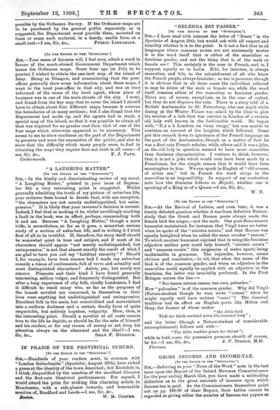(To THE EDITOR OF TEl "SPICCTATOIL."1 Sin, — At the Revival of
Letters, and even later, it was a keenly debated question whether it was from defective Nature- study that the Greek and Roman poets always made the female bird the singer,—not the male. One post-Renaissance humanist maintained, for instance, that Virgil knew no bettet when he spoke of the " sinistra cornix," and that Horace was equally benighted when he called the same croaker " annosa." To which another humanist rejoined that in using the feminine adjective neither poet could help himself, "sinister cornix " and " annosus cornix " (the exigencies of metre apart) being inadmissible in grammar. The rejoinder, however,. seems obvious and conclusive,—to wit, that when the name of the bird is of the common gender, and when an adjective in the- masculine could equally be applied with an adjective in the feminine, the latter was invariably preferred. In the First Eclogue occurs the line :—
" Nee tamen interea raucae, tua curs, palumbes." Now " palumbes " is of the common gender. Why did Virgil' (Nature-student though he was) write " raucae" when he might equally well have written " rauci "P The classical tradition had its effect on English poets like Milton and-. Gray, the former of whom makes
"the Attic bird
Trill her thick-warbled notes the summer long" ;
and the latter (though a Nature-student of considerable - accomplishment) follows suit with— "The Attic warbler pours her throat"; while in both cases the possessive pronoun should, of course, .










































 Previous page
Previous page